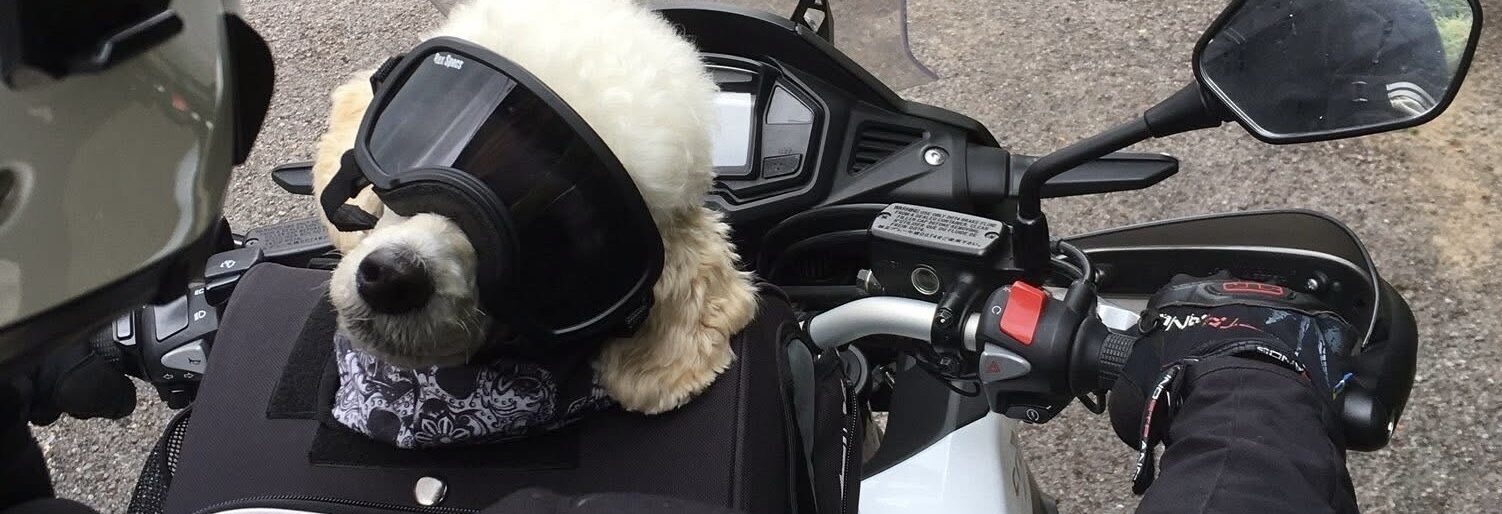
24 Nov 2025
Dora’s love of motorbikes and dogs helped her return to health
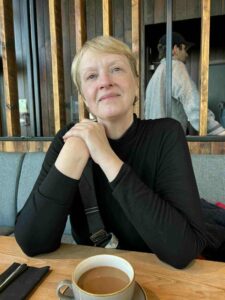
Dora Winslet
Having a goal at the end of leukaemia treatment helps many patients through the toughest times. A holiday with family, returning to a career, graduating university; each person is different. Dora had two much-loved parts of her life in mind during the lowest points of her treatment for AML, and here she talks about the thrill of being able to enjoy them once again.
“It was towards the end of 2020 when I woke up one morning with a pound coin-sized spot of blood on my pillow,” said Dora, now 60, who comes from the US but now a British citizen living in Berkshire. “I thought perhaps I’d scratched my ear and didn’t make much of it. I started getting frequent blood blisters in my mouth. I’d had them in the past, but only where I must have mistakenly bit my cheek, but these were nowhere near my bite-line.
“I recall feeling a little out of breath on occasion, but I didn’t feel unusually tired. I regularly walked my miniature poodle, Oz, and rode my motorcycle. Then I began noticing bruises forming all over me. I’ve always bruised easily, but I was puzzled to think I was becoming this ridiculously clumsy. My husband, Graham, remembers expressing concern that I looked pale, but I am very fair, and winter is always my palest season, so again, none of this really concerned me… except those mouth blisters.”
Dora decided to show the blisters to her dentist at her annual appointment. She’d continued to feel fit and well and rode her motorbike to the dental practice in early January 2021.
“The dentist thought it looked like a possible auto-immune issue and told me to go to my GP asap. I rode there straight from the dentist, and after the examination my GP booked an immediate blood test.
“A couple of days later I received a call from a haematologist at Wexham Park Hospital in Slough asking me to come to the hospital to talk. I told her that my intuition already told me it was bad news, so to save me the trip and just tell me. She said I had acute myeloid leukaemia (AML).”
“My husband was in tears. I was a little numb, but resolute. I was ready to go to war with this and I wanted to get started whilst I was still strong. I was already a cancer warrior, having beat breast cancer in 2017. I had only needed a lumpectomy and didn’t require chemo then, just radiation. I even rode my motorcycle to my radiation appointments.”
After further tests including a bone marrow biopsy and checks on her heart and lungs, Dora was admitted to Wexham Park Hospital in early March to begin treatment.
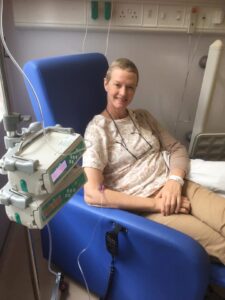
Dora during treatment
“I had two rounds of chemotherapy, each at least a month in hospital with around three weeks at home in between. The Covid pandemic was in full swing and friends could only visit outside the ward’s garden or through my window. Graham was working from home and isolating, so eventually they allowed him exclusively as a visitor in my room. The nurses were wonderful, but it was still a lonely time.
“Both rounds of chemo were very difficult. I remember collapsing on several occasions. I was put on oxygen and needed help from the nurses to do very basic things. Both times I broke out in chemo-rash, which looks similar to sunburn and turns into an ugly, patchy tan. The second round was the worst, my weakest, taking two extra weeks to recover.”
Dora had been told from the start she would need a stem cell transplant to reduce her likelihood of relapse. A young male donor was quickly found in Germany; Dora’s German heritage was an advantage.
“In August 2021, my third full round of chemo was at Oxford Churchill Hospital, followed by another quick, intense treatment on the two evenings before the stem cell transplant. This was the worst experience. I broke out in enormous hives and suffered extreme digestive upsets. By the next morning my donor’s gift was wheeled into my room. A nurse stayed with me as it was administered. I lay there, calm and relaxed, lovingly inviting these cells in. My thoughts travelled to the donor, wishing to envelope him in the warmth of my gratitude.”
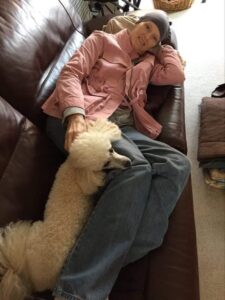
Dora with Oz during treatment
Dora made a quick recovery and was home after about two weeks. Then the hard work of regaining strength started. Walking or standing was difficult and ascending the stairs required crawling and pausing to rest.
“After about a month I started to feel much better and told the doctors ‘Yeah, I’m making progress!’ Unfortunately, it was just the effects of the steroids, and I had to be weaned off them which soon left me so weak I could barely hold my head up.
“After about a month and a half post-transplant I developed a terrible rash. This was Graft vs Host Disease (GvHD) which required a higher dose of steroids. At one point I was readmitted overnight due to digestive upsets. It was taking a long time for my red blood count to return to normal and I had transfusions every fortnight. My last transfusion was in January 2022 and thereafter my strength started to really come back.”
Dora’s love of motorbikes and dogs played a key role in helping her return to health.
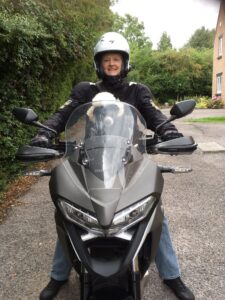
Dora and Oz on her motorbike
“I had a little dog that needed walking, and taking Oz out every day as soon as I was able really helped build my strength. I also had two motorbikes in my garage that I was desperate to get back on.
“I’ve ridden motorbikes for all my adult life. I was brought up in the remote dairy-country of western New York State. I spent my youth riding horses in the vast forests around my childhood home. I learned to ride a motorcycle as a teenager on those same trails. I came to England in 2008 to marry Graham, who was a horseman at the time, but we lost our horse a year later to colic. I decided to get my UK motorbike licence, feeling it would be a horse-like replacement, and it inspired Graham to do the same. We’ve toured Wales and Cornwall, and best of all I taught Oz to ride with me. Oz has special doggy goggles and sits in a secure doggy tank-bag. People seem delighted with my little ‘hairy biker’ and often ask to take his picture.
“I have an 800cc and a 125cc scooter. The scooter was light and nimble, so I started with that. Eventually I worked up my strength and nerve for the big bike. That first day out on it I was met with a need to pass another vehicle – the power as the engine surged and the wind rushed by – oh, what a thrill! It was great to be alive… so alive! When we reached our destination I ceremoniously hugged that bike.
“In August 2023 I rode my motorcycle to Oxford for my last consultation with the head doctor responsible for my transplant. His usually serious face broke into a smile when I walked in, my helmet and leathers in hand. In light of all my test results he gave me a higher than average chance of staying in remission. I thanked him for saving my life and asked for a quick hug. I remain in remission and the only medication I need is Phenoxymethylpenicillin, which I must take for the rest of my life.”
Shortly after this, another important chapter in her recovery unfolded.
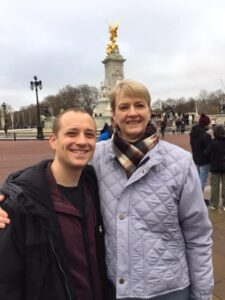
Dora and her donor, Felix
“I have been lucky enough to meet my donor. The donor system doesn’t allow contact details for two years, but does allow anonymous letters. The first year after transplant I wrote a letter for the hospital to send him, in English and German, telling him I was doing well and that he would always have a place in my heart…and my bones. He wrote back thanking me and saying how pleased he was. After two years I sent a message saying I’d love to exchange contact details. We’ve met up twice now in London. When I first met Felix I gave him a friendship bracelet I’d made during my downtime. I explained to him about the native Americans custom of mingling blood to become brothers and declared him my blood-brother, which made him smile. He’s having a baby soon; I’m hoping to go to Germany to meet my blood-niece or nephew.”
Another important connection gave Dora solace during her treatment.
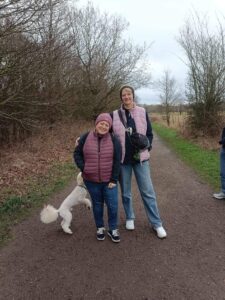
Dora and Herta
“Through a Facebook group for tall women (I’m 6’1”) I found a leukaemia mentor. I’d told the group that I was going into hospital and she private messaged me. She was in hospital already and weeks ahead of me with her AML treatment. She described what to expect step by step and it helped so much. She’s doing well and we’re still friends. A couple of years later she introduced me another, much younger woman, Herta, who was just starting her treatment and was going to need a transplant. She was quite frightened and expressed concerns about her mortality. I encouraged her to stay positive. I told her, ‘Planning for death is just writing a will. Planning for life is much more fun.’ Her recovery went quicker than mine – perhaps the benefit of youth. She is now in remission and raising a son with her loving partner. We are close as family now.”
“I am eternally grateful to the NHS for saving my life… twice… and very likely my life savings as well, for had I stayed in the States the medical care costs would have been a much different story.”
“During my chemo treatments I kept a picture of my poodle, Oz, at my bedside to remind me that I was loved and needed. One night at my weakest point I had a vivid dream. I was walking in a beautiful, peaceful forest with all my dogs who have passed. I was contented… until, at a curve in the trail, my progress was suddenly halted by branches and briars. I could see my dogs continuing happily on down the trail. My dearest departed dog, my furry soulmate, a toy poodle called Nicholas, paused and, turning to look back lovingly at me, wagged his little pom pom tail before trotting off to join the others. In life he would never have left my side, so I felt he was telling me that he was happy in this other realm and they would all be there when I was ready to join them, but it just wasn’t my time yet.”
Share your story
We want to help people tell and share the leukaemia stories that matter – stories like Dora’s and stories like yours.
Related posts
29 November 2021
John Goldman Fellowship awarded to Dr Pramila Krishnamurthy
Leukaemia UK is proud to announce Dr Pramila Krishnamurthy of King’s College Hospital and King’s College London as a Leukaemia UK John Goldman Fellow co-funded by Rosetrees Trust. Dr Krishnamurthy will be using the fellowship to better understand why some leukaemia patients relapse following a stem cell transplant, and how donor lymphocyte infusion can help prevent this.
2 October 2023
Three leading charities collaborate to fight childhood cancers
New Partnership we3can to fund research into three most common childhood cancers Today (2nd October 2023), three leading cancer charities have launched a new collaboration in order to improve the…
20 September 2021
Leukaemia charities unite in Blood Cancer Awareness Month to improve diagnosis and the chances of survival
Leading UK leukaemia charities Leukaemia Care and Leukaemia UK have announced a new collaboration to increase awareness of the signs and symptoms of leukaemia and drive improvements in the diagnosis of the disease. The campaign, Spot Leukaemia, is running throughout September – Blood Cancer Awareness Month.
17 September 2024
The food industry’s great and good come together to celebrate 25 years of Who’s Cooking Dinner? and raise over £280,000 for leukaemia research.
London’s hottest charity culinary event, Who’s Cooking Dinner?, celebrated its 25th anniversary at The Dorchester on Monday (16th September). It was an event to remember with chefs including Tom Kerridge,…